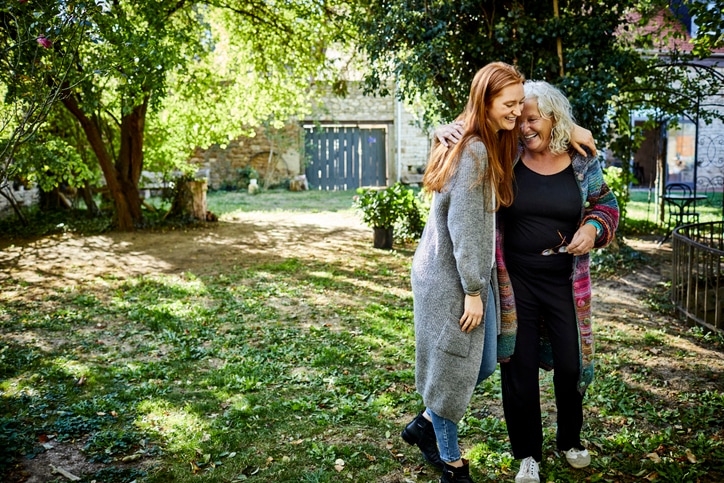If you are in an interfaith relationship, you probably get asked — a lot — about the religion you’ll choose for your kids. Rest assured that as with most parenting topics, the askers will have strong opinions about your answer. Despite the opinions of your clergyperson, co-worker, or mother-in-law, there is more than one viable way to raise interfaith kids. The trick, of course, is determining what works best for your family, and not the one down the block.
According to the Pew Research Center, around one in five adult Americans are raised in interfaith homes, and that number is growing. So even if you haven’t yet decided on the best solution for your family, you can take comfort in knowing you’re in good (and large) company.
Raising interfaith children can be challenging, but you already know that raising kids is challenging, period. The “what religion should our children be” question may not be an easy one to answer, but it can’t be ignored. Keep in mind that no matter what you decide, it’s possible to create a religious framework that’s capable of supporting your children’s spiritual growth while also bringing harmony to your household.
1. Make the Decision Before You Need to Make the Decision
Before kids come, you may find each other’s religious differences easy to morph into daily life. This seamless acceptance may set the tone for your life together with children — or it may backfire if there is no real honesty, or game plan, underneath.
The time to think about how you will raise your kids is way before you have them, preferably before you get married, if marriage is part of your plan. Talking this through early on can provide insight into who you are as a couple, as well as who you will be as parents. It also brings to the forefront make-or-break options, such as conversion, which may bring you closer together or provide clarity about calling it a day.
“My fiancé adored Passover at my mother’s house, and seemed to enjoy my being Jewish,” Linden Kahan told Care.com. “He was Baptist, but claimed that religion wasn’t that big a deal for him. Neither of us attended services, so it came as a shock when, on my wedding day, he presented me with a document to sign stating that we would raise our kids Baptist. There I was in my wedding dress. What was I supposed to do, call the whole thing off? I didn’t sign, and we ultimately divorced. I wish I had known his feelings before it all got that
Far.” Linden went on to have interfaith children with her second husband, a Catholic.
Kahan’s experience, while dramatic, is not all that unique. “The question of how to raise children sometimes comes up before a couple gets married, but it’s also been my experience that many couples never weigh or discuss these issues whatsoever until they already have a child,” says Rabbi Shlomo Zalman Bregman, a well-known rabbi from New York City and founder of the Jewish Executive Learning Network (JELN). He feels that the number one thing couples should do is communicate openly about what faith heritage means to them. “A good place to start is by talking through your feelings about religion. Is it important to you? Is it something you carry in your heart, or does it have a consistent, outward expression in your life through the foods you eat, the clothing you wear, or regular attendance at a place of worship?”
Rabbi Bregman stresses the importance of discussing the specific religious experiences you wish your future children to have, such as a bar or bat mitzvah, namkaran, or baptism. Think about what you want for your children and how you will feel about the rituals you choose, and whether they represent your partner’s religion instead of your own. Once you know what each of you can’t live with, or without, you’ll be able to create a road map for your spiritual life as a family. This may include any number of choices, including no religion, one religion, or morphing both together, as well as the frequency and types of rituals you will enjoy together.
2. Understand the Difference Between Religion and Tradition
Do your feelings about religion have more to do with a steadfast commitment to Torah than they do with the heart-tugging, scented memory of your grandma’s challah baking? Are they about the giggling joy of Christmas morning, Ramadan’s Night of Power, or the serenity you feel after the call to prayer?
All religions are more than belief systems. They also contain elements of pride-filled cultural identity and poignant family memories. It may be helpful to tweeze all those aspects apart when you’re deciding on the role that faith will play in your children’s lives. In some families, having a Christmas tree, as well as lighting Hanukkah candles, will suffice. In others, delving deep into each family member’s spiritual questions around the dinner table or reading the Bible may be more important.
“Religion is spoon-fed, but faith is lived,” says Dr. James Coyle, a licensed clinical pastoral counselor and author of GPS: Your Guide through Personal Storms. “Religious rituals impact almost every holiday and season. The biggest challenges for many interfaith families are the celebrations and traditions established throughout the year. It is healthy to expose kids to the rituals and expressions of different faiths. Kids can sometimes help guide and direct a faith response to the specific needs of the family. There is a common core belief, and that is to establish hope, faith, and love. If couples can embrace these words as ways of life, the family will grow together.”
Candyce Walti, an ordained minister in Ohio, agrees. Walti eschews labels, but considers herself interspiritual. Her husband, Brian, is an atheist. Given their differing ideologies, the topic of religion comes up a lot in their daily lives. “Ever since our children were born, we have encouraged their curiosity about anything and everything,” Walti explains. “They have both witnessed Brian and I openly discussing our theological and philosophical beliefs. My husband does not wish to change how I see the world, and I do not have a desire to change his worldview. However, we do listen intently to one another and ask a lot of questions—taking each other out of perceived comfort zones and to deeply consider our standpoints. This has provided our children a safe space in which they, too, can navigate through their own feelings, concerns, and beliefs to seek a path that feels right to each of them. Knowing that spirituality ebbs and flows with individual experiences, the beliefs of my children will likely change as they grow. It is my job as a parent to provide an environment in which they feel safe to do so.”
3. Choose a House of Worship
You may decide that the best way to practice your faith is to not practice your faith at all, but instead focus on cultural identity. Attending services at non-theistic places of worship, such as Adat Chaverim, a Humanistic Jewish community in Encino, California, may provide a viable path for your family to follow. “Admittedly, our congregation is unique. Not only is it non-theistic in its approach to education and rituals, it also recognizes that being Jewish is, for most Jews, just one aspect of the complex identities we carry in the 21st century,” says Jonathan L. Friedman, Ph.D., Adat Chaverim’s education director. “Most children in our group grow up seeing no contradiction in celebrating Christmas and Hanukkah in their homes, and typically do not accept the theological claims of either tradition. If the ‘faith’ element is not stressed, then the multiple backgrounds — Jewish, Christian, Buddhist, Zoroastrian, and others — become rich sources for cultural hybridity, rather than bifurcated categories. There is, after all, a humanistic thread that ties all religions together.”
There are also houses of worship, such as the Living Interfaith Church in Lynwood, Washington, which celebrate interfaith as a faith unto itself by focusing on the spiritual path rather than religious teachings. This is the type of congregation that felt right to Kahan and her husband, Charlie. “After my first near miss, I knew that I wanted to honor both my husband’s and my own love of our faiths in a way that provided no contradictions for our daughters,” she says. “Interfaith services are a good way for us to focus on the spiritual similarities of our faiths, instead of their differences.”
Some interfaith families eschew formalized prayer altogether. Others choose one house of worship to attend. Still others alternate their places of prayer so that their children can learn about, and get comfortable with, both religions.
4. Factor in Your Extended Family
Even if you feel like you’ve got this religion thing nailed down, you’re still going to need a game plan for including each other’s families in your lives, especially on holidays. Rabbi Bregman strongly suggests discussing the role your extended families will play when you first decide your family’s religious path. “It is axiomatic that when you get married, you’re not only marrying the person but their whole family as well,” he says. “I’ve seen countless times where an interfaith couple has wed with no particularly strong religious views, but their parents and extended families have tried to exert a religious viewpoint and identity onto their child.”
Even if both of you are comfortable with your choice, whatever it may be, your child’s grandparents, aunts, and uncles may be less so. Creating boundaries, gently, with your extended family members, as well as presenting an unassailable, united front as a couple, is integral. Let them know what is OK with you, and what isn’t. For example, telling Bible stories that focus on a particular religion may be perfectly fine, but taking your children to religious services without your permission is off-limits.
Children are complicated creatures. Some will find utter delight in the spiritual training you expose them to. Others, as they get older, will seek out a religion of their own, answering a pull you cannot define. “Scriptures teach us that we are born with an innate knowledge of God,” says Dr. Coyle. “Our job is to develop our kids physically, emotionally, and spiritually. This begins with our children’s first breath.”
No matter how you choose to take on this amazing journey as a family, if you do it with love, commitment, and honesty, you’re on the right religious track.






